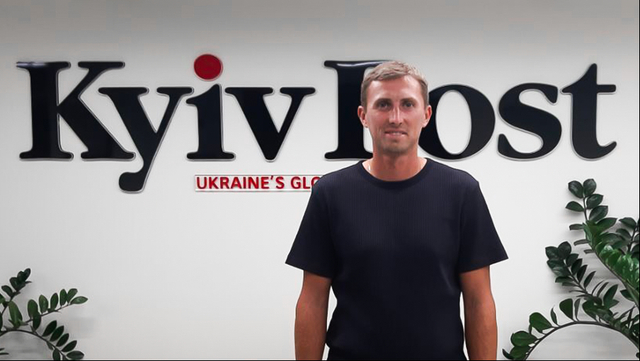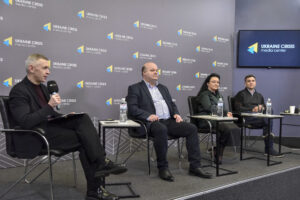
The Kyiv Post continues its series of stories about Ukrainians who, during the war, are not only surviving but also changing their lives, helping others, and working for the future of their country.
Oleksandr Stetsenko, founder and head coach of the Junior Kids Academy soccer school for children in Sofiivska Borshchahivka in the Bucha district of the Kyiv region spoke about his career, both as a player and coach, children’s soccer in Ukraine in general, and more.
JOIN US ON TELEGRAM
Follow our coverage of the war on the @Kyivpost_official.
Oleksandr Stetsenko – footballer and coach
KP: Tell us about yourself.
OS: My name is Oleksandr Viktorovych Stetsenko. I was a professional footballer whose career started as a child at FC Kyiv, which was located in Sofiivska Borshchahivka, and then moved to the Dynamo Youth Sports School (Kyiv). After graduating from the academy, I began my professional career at Dynamo-2.
KP: Could you tell us a little more about your career?
OS: At first, while training at the Dynamo academy, I played for a club called Vidradnyi – which no longer exists. I was captain of one of the teams which ranked high in the Ukrainian championship.
I also played for Ukraine’s National youth teams: U-16 and U-17. After graduating from the Dynamo academy, I played for Dynamo-3, Dynamo-2, and the main team’s reserve squad. Then for Metalist (Kharkiv), Arsenal, FC Sevastopol (then still a Ukrainian club – ed.), and Chernihiv’s Desna. I also played for clubs in Tajikistan, Kazakhstan, and Israel.
Caption: During a match between Chernihiv’s Desna and Donetsk’s Shakhtar. All photos here and below are from Oleksandr Stetsenko’s archive.
But! When I look back on the past, the most important thing for me is not even which clubs I played for, but rather which coaches I was lucky enough (yes, lucky enough – O.S.) to work with. These include Yuriy Oleksandrovych Len, Viktor Ivanovych Kondratov, Leonid Stanislavovych Kuchuk, Myron Bohdanovych Markevych, Yuriy Leontiyovych Moroz, Yuriy Mykolayovych Kalitvintsev, and many, many others.
Caption: Oleksandr Stetsenko playing for Istiklol (Tajikistan).
KP: Who had the greatest influence on your development?
OS: Probably, Yuriy Len, Yuriy Kalitvintsev, and Yuriy Moroz through the Ukrainian youth team.
I would like to say something separately about Myron Markevych. I was lucky to work with him when I played for Metalist in Kharkiv. It was during this period that I understood what a great coach he was. Yes, he had favorite players whom he forgave almost everything (such as Oleksandr Rykun), but I have never come across anyone as gifted as him. He was almost never wrong when assessing a player’s potential.
For Ukrainian football, Markevych is a figure who is certainly on a par with Valeriy Lobanovskyi. You could say that Markevych is the “Lobanovskyi of the Independence era.”
KP: What was your greatest achievement as a player?
OS: Probably playing in the AFC Cup final when I was with Istiklol in Tajikistan. Although we unfortunately lost 0-1it was a great experience. Another highlight was playing for Ukraine’s National youth team in the final stage of the U-17 European Championship.
Tajikistan’s AFC Cup.
KP: When did your career officially end?
OS: In 2020, just when COVID started, I couldn’t leave, even though I had an offer to play in Israel. After that, I decided that was enough.
I didn’t leave football completely. I played in the Kyiv region championship for the amateur teams Juniors and Sturm, which were then managed by Dmytro Dymnych and Ihor Nakonechny. Actually, one of them, Dmytro Dymnych, an enthusiast and fan of football, would later play an important role in the development of our Junior Kids Academy.
Sturm eventually became Kolos-2 from Kovalivka.
About Junior Kids Academy
KP: When did you start your own project, the Junior Kids Academy? Why did you start it, weren’t you tired of soccer?
OS: I opened the school back in 2020. Why? Well, first of all, I always saw myself as a coach once I stopped playing. I’ve always liked the job and decided to start at this level, coaching children.
After obtaining a license from Ukraine’s football association (UAF), I initially held individual training sessions. Then I had the chance to study the work of the Kyiv branch of Portugal’s Benfica. Once I had learned a little from them and understood how it all worked, I opened my own school.
Junior Kids Academy at the Lyceum stadium.
We managed to reach an agreement with the director of the Sofiivsko-Borshchahivskyi Lyceum and opened on Oct. 18, 2020; initially with only one group.
Now we have four groups of different age categories. The oldest is a mixed group of children aged 12 and 13.
The Junior Kids Academy training field.
KP: What is the main factor of your approach?
OS: The main thing for us is the development of children, we practice an individual approach. Most importantly sport can be character building turning out a decent person.
We have an excellent coaching team: Vyacheslav Bogodielov, who trains goalkeepers, two other football coaches, Alexander Shumak and Sergey Ichansky, as well as Alexander Palamarchuk, who teaches our children athletics.
Not all children who come to us will become professional footballers – that is obvious, as many factors influence that – so we show, explain, and not only train, but also educate.
Oleksandr Stetsenko with one of his students.
We want children to dream! It’s not for nothing that they say dreams come true! Here, they train, dream, and receive the right upbringing, if you will (he smiles – ed.).
KP: OK, Oleksandr Stetsenko, as a coach. What do you tell the children? What is your understanding of football, what do you teach them?
OS: I’ll start with what football means to me, even ignoring the professional. You can play at the children’s level, or at any level. Let’s take, for example, a hypothetical “30-year-old” who never became a professional, but still played football as a child, tried… But it didn’t work out! Maybe he didn’t play at the adult level, or maybe he did, but not at the professional level.
So there you have it. The most important thing is that he went through the school of life called “soccer.”
First. Most men who played soccer as children will retain positive memories.
Second. Football is a team game. It’s about character, communication skills, and the ability to find common ground with your teammates. The game is a concentration of all the basic principles of life that you need to learn in order to achieve results.
So yes, football is life.
A soccer school is a school of real life
Oleksandr Stetsenko
About your career and more
KP: What was the most difficult moment in your career and how did you cope with it?
OS: I had several difficult moments. Two injuries in childhood, at the academy. And when I finished my career, while playing “for the region,” I tore my cruciate ligament during training.
I managed to cope with them thanks to the support of my family and friends.
The people around a footballer outside the field always play a decisive role.
KP: Which of your former colleagues do you keep in touch with and maintain relationships with now?
OS: I talk from time to time with Andriy Yarmolenko, whom I meet at the Dynamo training base (Oleksandr Stetsenko also works as a coach for the Dynamo under-14 children’s team) Andriy’s son came to our training once, just to keep in shape.
I play on the same team as Yevhen Khacheridi every week. We have a group, we play at the Bannikov Stadium, so we get together and stay in shape. I can say that Yevhen is currently in such good shape that he could give many of our national team players a run for their money as a center back n.
KP: What are the current goals and objectives for Junior Kids?
OS: The development of our children. Since we are an official partner of Dynamo, we are essentially preparing some children to transfer to their academy. Four of our students are already training with Dynamo. I can say for sure that no other school lets children go to other academies as easily as ours. If we see that a child will progress better at another school, we let them go (even in Ukrainian children’s football, there is already competition, sometimes unfair, for the best players – ed.)
KP: Do you have any plans for expansion?
OS: Not at the moment, we are working within our means. If we had more time, we could increase the size of the groups. Because, first and foremost, this is a social project. We really don’t have a commercial interest. For example, we give the children uniforms for free.
Yes, now some of the costs have to be borne by the parents, such as entry fees for tournaments – which is generally normal practice for all football schools in Ukraine.
But we always strive to reduce the financial burden on parents, so we are constantly looking for sponsors for our project.
KP: A philosophical question. What is the current state of Ukrainian football, in your opinion?
OS: It is currently in a coma.
KP: And children’s football in Ukraine in general?
OS: It is in its early stages of development. Before the war, our football was generally at a good level, but conflict has brought a need for some adjustments. However, clubs are still trying to maintain their schools and academies, and new football schools/clubs are emerging.
KP: Is there a difference in the approaches of different clubs to training children?
OS: Yes, there is. We can compare many clubs. But all clubs will have one goal – to train and improve players.
The question is how the academies work. Obviously, Dynamo and Shakhtar are leaders in terms of selection: from the youngest age to juniors. All children, if they have a choice, will go to Dynamo or Shakhtar. But all other Ukrainian professional teams take those who are “left over.”
Moreover, Dynamo and Shakhtar, historically (at least for now), have more opportunities to participate in prestigious international tournaments. This makes a difference.
In general, when it comes to the development of youth football, it is worth mentioning that our young players find themselves in a somewhat strange situation after graduating from the academy. At the age of 17, when they finish football academy, they already sign professional contracts but continue to play at the youth level, in U-19 teams.
Why don’t our clubs register players under 19, for example, in the Premier League or the Second League? Because this is already adult football, where everything is much more intense and the competition is higher. And this would definitely contribute to their growth.
KP: What does Ukrainian children’s football lack overall? I am talking primarily about the transition from children’s/youth football to adult football. It seems that the statistics in Europe are much better than ours.
OS: First of all, I think the problem is in the mentality. The lifestyle and circumstances in which our country finds itself are now crucial for the formation of an adult footballer.
Let’s also note that no one currently knows the statistics on how many young players go abroad.
And in general, it is not entirely accurate to say that our statistics on the transition to adult football are worse than in Europe, because we do not know the real European statistics.
And let’s be honest, the number of professional clubs in European countries is much, much higher than in Ukraine. All this together makes a difference in the development of the game, which, unfortunately, is not in our favor.
KP: What can you say about the level of training of children’s coaches?
OS: This issue remains a problem. In reality, there are many people who simply pretend to be coaches. Often, they do not have a license, for example. That is why we always recommend to parents and even children: at least ask such a “coach” – what are you doing, and why? What is the purpose of this or that training? This is also a problem, and it is a problem everywhere.
KP: Last question. If you were in my place, what would you, as a journalist, ask Oleksandr Stetsenko?
OS: Probably the only question I have for myself right now is: when will you coach a professional team?
But everything has its time… (smiles – ed.).





